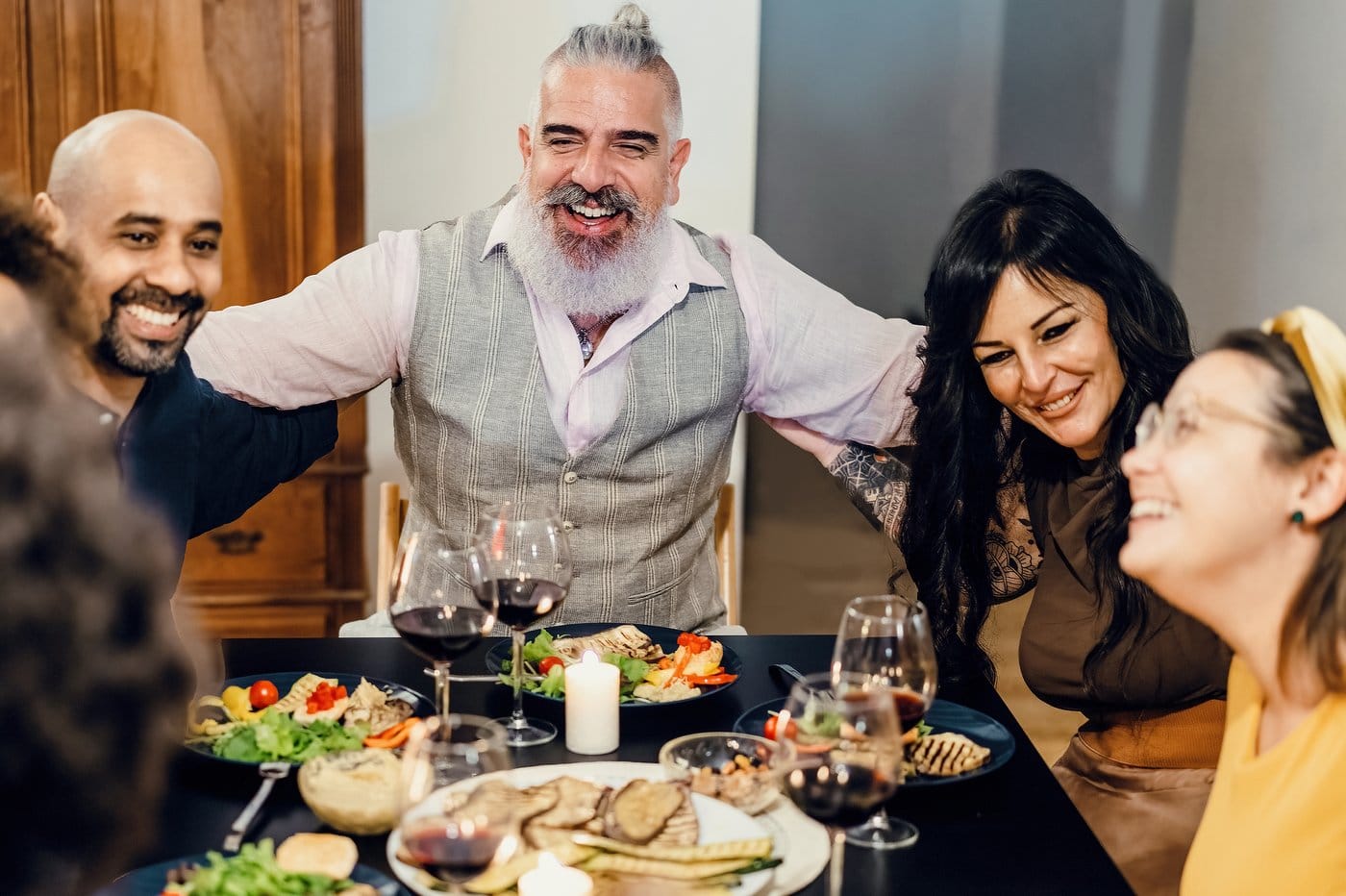There’s little doubt about the importance of friendships. In fact, a strong social circle can help us maintain good health and even help us live longer.
Although humans are biologically wired to need companionship, research has actually found that people’s friendship networks have shrunk since the 1980s.
Our connectedness has decreased — and with the rise of social media, people are spending more time online and less connecting in person.
So how, as adults, do we make friends as an adult? It’s a question not limited to Gen X, but applies just as much to Boomers and Generations Y and Z.
Why adults have fewer chances to make friends
If you spend any time watching kids, chances are you’ll have seen moments when — on a playground or at the pool — they easily struck up a conversation with other kids and began playing. (Maybe you remember doing the same when you were young.)
For many of us, it’s hard to imagine as an adult sitting down at a table with a complete stranger and engaging in conversation.
Psychologist Shilagh Mirgain, PhD, says part of the challenge is that, as grown-ups, we simply don’t have the same opportunities to make new friends.
“For friendships to develop, you really need three essential things — proximity, a setting where people are likely to let their guard down, and spontaneous interaction.
“In our teenage and college years, we have a lot of opportunities for that kind of interaction,” she explains. “But in our 30s, 40s, 50s and older, we have more commitments and don’t necessarily have the space.”
We can also feel tentative in making friends as an adult, and with a spouse, children and work colleagues, we may even feel our emotional needs are being met anyway.
But, as Mirgain points out, it’s important to keep expanding our support circles and make friendships a priority. Friends move away, we change jobs, and in the busyness of life, we can struggle to foster those close connections.

It’s true: friendships take work
“There’s no question it takes a lot of work,” Mirgain says. “If we only have so much time, we’re more likely to go to those we already have connections with. We may be so busy with family activities or our careers that friendships become ones that work with the convenience of our schedules.”
Mirgain also notes that the nature of our friendships may change with age. In our early 20s, we might see our friends multiple times per week. As we age and our obligations increase, it might be once a month, or once every few months.”
We may also have friends based on activities — the friend you go to exercise class with, the friend you attend book club with, the soccer mom you watch the game with.
The key, though, is that it really is about the quality of the relationship, not the number of friends.
“As humans, we’re social creatures who need that sense of belonging, being a part of the community. It is an aspect of our make-up,” says Mirgain. “Since we typically choose our friendships, they provide a unique opportunity to foster each other’s growth and make each other a better person.”
How you can make new friends: First, be brave
One way to make friends as an adult is to seek out places where you have an interest in going — join a club or organization, go to church, volunteer for a local group. And when you do, try to reach out to others.
“It requires a bit of bravery. But by putting yourself out there, you may discover an amazing friendship you haven’t even anticipated,” says Mirgain.

For the doctor, that happened during swim class. She and one of the other participants struck up a conversation, and by the end of class had exchanged phone numbers. Over time, she says, the other participant became one of her closest friends.
Connecting around a shared interest helps open the door to getting together in the future. Perhaps it’s an art exhibit or visiting the local botanical garden.
The important thing is to reach out and express interest by saying something like, “It would be nice to get together sometime.” And, it’s important not to take it personally if they are too busy or not interested in getting together again.
Work, social media and more
While the workplace also creates an opportunity to engage with others, it can also present some challenges. If you move or change jobs, the common experiences or interests you shared may no longer be there. The same is true for parents who connect over a child’s sport or activity. When the child stops playing, there may no longer be that shared interest.
Social networking can be another way to engage with others. But, Mirgain says, the health benefits of friendships come from being together face-to-face (when it is safe to do so).
It’s also important to remember that the experiences presented in social media can be a carefully cultivated image of someone’s life.
If you spent more time with that person in person you’d likely see a more gritty reality (like, seriously, we all know that every picture perfect family Christmas card is a split second of perfection in the chaos — and even that presumes photoshopping wasn’t involved!).
“Social media has some wonderful benefits, but it can’t replace the direct connection of friends,” says Mirgain. “It’s critical to keep making time together a priority. To be seen, heard, known, and appreciated unconditionally are some of the gifts of friendships.”
What’s next? Here’s how to make friends in 3 steps:
Step 1: Be open to new experiences and people around you
You will never know who you can meet and what you can do if you don’t interact with other people. Try to be open to new experiences and people around you. You’re not too old to try and learn new things!
Don’t underestimate the opportunities to connect with people and perhaps even reap new friends from your day-to-day activities out in the world — at work, the coffee shop, the grocery store, library or the gym.
If you’re introverted and don’t mingle in the world as part of your daily routine, carve out those opportunities intentionally so you have a chance to make new friends.
For example, commit to a volunteer opportunity with social interaction that routinely gets you out of the house. Make sure it’s something fun that interests you so much you wouldn’t dream of bailing out (yes, we know how it is!).
Find common ground with those who have different interests from yours. The more diverse your relationships, the more you will make friends and reap the benefits for your career, life, and happiness.
Step 2: Leverage social media to meet new people
If you’re finding yourself spending too much of your leisure time scrolling your social media feeds mindlessly, and/or bickering with strangers on Facebook — hit the brakes!
Switch things up and make new friends by putting the internet to work for you in a way that serves your health and wellbeing.
Social media can make all of us feel (and behave!) misanthropic, but used properly it’s a powerful tool you can use to meet people and make friends of all ages. Here are some ideas:
- Join a Facebook group or find a local meetup to help you find and make friends. Tapping the power of the internet by getting involved in a group is a low pressure way to meet new people and play the field a bit before committing to in-person events.
- Be selective — seek out groups that are aligned with the things that interest you, and then narrow down the offering to those that have rules and moderation to stay on topic.
- Join a group for your neighborhood. This is a great way to find out about local events and meet people on the same wavelength as yourself. Again, be selective, if the group has a negative vibe or otherwise doesn’t serve you, don’t hesitate to unsubscribe.
- Facebook is a great source for finding local events from festivals and street fairs to large concerts and small venue performances, art exhibits and so on. If you aren’t comfortable attending an event alone, consider meeting up there with some new friends you just made online!
Step 3: Learn how to start conversations with people you don’t know
It’s often hard to start conversations with people you don’t know, but there’s no avoiding it if you are looking to make friends. We think you’ll find that if you use these tips, it’ll be easier!
- Start with something about the environment around you or the function you’re attending together;
- Be polite and compliment the other person on something they’re wearing;
- Talk (briefly!) about something interesting that’s happening in your life and then ask the other person questions about theirs;
- Avoid off-putting conversational traps like dominating the conversation (ask questions and practice active listening), lecturing or being condescending (be humble!), being self-deprecating (be confident!) and for the love of all that’s holy, don’t be argumentative, especially about politics.
It’s important, when you’re on this quest to make friends as an adult, to accept that you will strike out. But don’t let that defeat you. We’re not everyone’s cup of tea, but the more we take these risks, the more people we’ll find that are.









